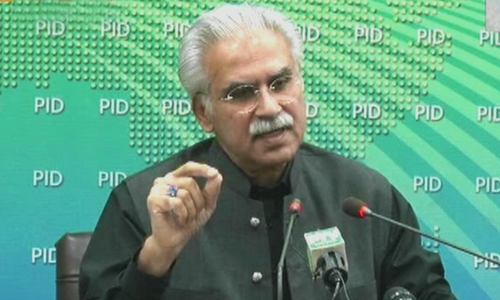ISLAMABAD: There have been 2,777 cases of dengue this season in the capital, according to a report from the Ministry of National Health Services (NHS).
According to the report, which is available with Dawn, seven Islamabad residents have died of dengue. There have been more than 16,000 cases of dengue reported across the country.
The ministry is hoping that dengue cases will fall along with the temperature, but efforts are also being made to ensure every patient can be given a bed in hospitals.
NHS Secretary Dr Allah Bakhsh Malik told Dawn that 1,000 beds have been vacated in private hospitals to ensure availability.
He said: “Sehat Sahulat programme CEO Dr Faisal Rifaq has been appointed to coordinate and deal with private hospitals, namely HBS General Hospital on Taramri Road, Akbar Niazi Hospital in Bhara Kahu, Al Nafees Hospital in Farash Town, Dr Sadaf Specialists Hospital on Lehtrar Road and Al Ain Hospital.”
He added that all efforts and resources have been mobilised to curb the dengue epidemic in Rawalpindi and Islamabad. Coordination is in place at the highest political and professional levels, he said, and a new team has been installed at the district health office with the required resources to respond in areas where a dengue case has been reported.
A rapid response dengue control and operation team has been established, he added.
“All the five hospitals in Islamabad, Pakistan Institute of Medical Sciences, Federal Government Polyclinic, National Institute of Rehabilitation Medicine, Federal General Hospital and Capital Hospital have been put on high alert,” he said.
Dr Malik said that the administrations of Rawalpindi and Islamabad are invited to daily review meetings to strengthen efforts to deal with the situation, which is under control and expected to fall in the next week due to fall in temperature.
“The ministry is focusing on a pocket by pocket disease situation and response activity. Local public representatives and MNAs in Rawalpindi and Islamabad have been engaged in response activities. Surveillance for mosquito larva is ongoing and response is undertaken immediately through dedicated teams,” he said.
In response to a question, he said that considering the meteorological forecast it is envisaged that cases will start declining as temperatures fall below 22°C.
Separately, 38 people have been arrested under section 144, which has been enforced to control the spread of dengue.
According to health department directions, citizens are to ensure that stagnant water does not accumulate at shops or houses as dengue mosquitoes breed in clean stagnant water.
Police have registered cases against the owners of tyre shops, warehouses and service stations where stagnant water has been found.
A police spokesperson said 17 cases have been registered against people for violating protocol.
“People have to make sure they do not let water remain stagnant as it becomes a reason for larva to breed and cases of dengue increase as a result,” he said.
Published in Dawn, September 30th, 2019














































